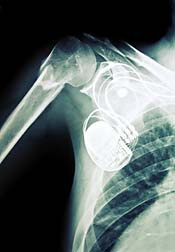 In recent days the Government Accountability Office has hammered the FDA for not doing its' job with regard to ensuring that medical devices are safe (the FDA, says the GAO, can't ensure as much), and is dragging its' heels when it comes to fixing a problem that has been around for decades.
In recent days the Government Accountability Office has hammered the FDA for not doing its' job with regard to ensuring that medical devices are safe (the FDA, says the GAO, can't ensure as much), and is dragging its' heels when it comes to fixing a problem that has been around for decades.The basic issue lay with Class III medical devices—some of the most complex devices designed to maintain and prolong life, such as a heart pacemaker. When the rules for the approval for medical devices were set in 1976, the FDA was allowed to give perfunctory approval to an update of an existing medical device, provided that the update was similar to the original design.
This is apart from the significant steps, which are required, when a device is considered a radically new design, or is actually invented as a new avenue to treat an existing condition currently handled through other means, if at all.
However, it has been revealed that the original legislation passed 33 years ago, together with a companion law enacted in 1990, required that the FDA come up with firm deadlines for the establishment of more rigorous testing protocols for all Class III devices regardless of their similarity, prior to approval.
Rigorous testing, after all, is the only sure means by which to pronounce a device as safe and effective.
It took the FDA 5 years to respond with a plan to write the rules, without actually writing them. But they had a plan in 1995.
That was 14 years ago. The agency has done nothing since.
The GAO has pronounced in its report that "it is imperative that F.D.A. take immediate steps" to update systems for approving devices.
Dr. Andrew von Eschenbach no longer heads the FDA. He stepped down on January 16th, just days before the inauguration of President Obama. In his presentation to the GAO, Dr. von Eschenbach said, "it is a great shock and surprise when someone says you have cancer. The truth of the matter is that process has been going on for a long time before it became apparent in that particular way."
And yet, according to a recent report in the New York Times Dr. von Eschenbach was describing the FDA, as recently as April of last year, as being "eminently successful up to this period of time," and that its budget was largely adequate. This, in spite of endless criticisms of fast-tracked medical drug and medical device approvals, lax inspection of food plants and offshore manufacturing facilities. Most have held the view that the FDA has been grossly under-funded for years.
The acknowledgement that new money, and new staff was needed in order to properly fulfill the agency's mandate came only after repeated inquiries by Congress.
For their part, manufacturers of Class III devices feel vindicated at the expectation that many medical devices, such as pacemakers, would be re-classified as Class II (which carries less risk) once the FDA completes the overhaul. Dr. Susan Alpert, the chief regulatory officer for Medtronic, said "the impression that (the) FDA.is approving new technologies with little review is erroneous."
But that's not how Public Citizen (PC) sees it. The exceedingly active consumer advocacy group views the GAO report as a window into the inner workings of an ineffective FDA, providing a view that "shows the agency has turned a blind eye to many devices, some of them dangerous," says Dr. Peter Lurie of PC, "by ignoring the statute and failing to re classify them."
READ MORE MEDICAL DEVICE LEGAL NEWS
If an employee was asked to do a job 19 years ago and still hadn't gotten around to it, would that employee still be working today?
Medical devices are a fact of life today, and perform great service in prolonging life. But like medical drugs, products that are ingested or implanted and become a part of the human body need to be proven, and assured as safe. In too many cases, they are not and the headlines trumpet the sad results of Americans sickened, injured or ultimately killed by preventable malfunction. Until the FDA deficit is finally addressed, a medical negligence attorney might be an option you should consider…
